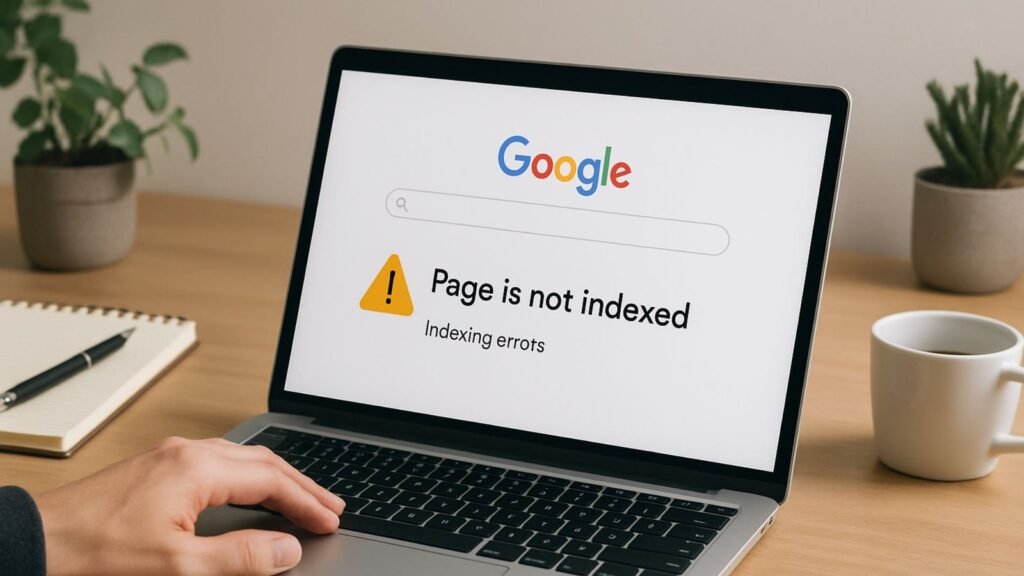If your WordPress page isn’t indexing on Google, it could be due to noindex tags, blocked robots.txt, poor internal linking, or technical SEO issues. Here’s how to identify the problem and fix it step-by-step.

Why is my WordPress page not indexing on Google?
If your WordPress page is live but not showing up in Google Search—even after days or weeks—you’re dealing with a common but fixable SEO problem: indexing failure.
Indexing simply means Google knows your page exists and includes it in search results. If that’s not happening, something is blocking or confusing Google’s crawler.
Let’s walk through what might be going wrong and how you can fix it quickly.
First: How to Check If Your Page Is Indexed
- Go to Google.com
- Search for:
site:yourdomain.com/page-slug
If nothing shows up, it means Google hasn’t indexed that specific URL yet.
Common Reasons Your WordPress Page Is Not Indexing
1. Noindex Tag Is Active
This is the #1 cause. A “noindex” tag tells Google not to index the page.
How it happens:
- SEO plugins like Yoast or Rank Math are set to noindex for that page.
- WordPress is blocking indexing globally (check your Reading settings).
How to fix:
- In your WordPress dashboard, go to:
Settings > Reading > Search Engine Visibility
Make sure “Discourage search engines” is unchecked. - Edit the page > SEO plugin settings > Make sure “Allow search engines to index” is enabled.
2. Blocked in robots.txt
If your robots.txt file is blocking Googlebot from crawling certain sections, indexing won’t happen.
How to check:
Visit: yourdomain.com/robots.txt
Look for lines like:
Disallow: /wp-content/
Disallow: /your-page/
How to fix:
- Remove or edit the Disallow rule
- You can edit robots.txt using SEO plugins or via FTP
3. Canonical Tags Point Elsewhere
A canonical tag tells Google which version of a page is the “main” one. If it points to a different URL, your page might be skipped.
How to check:
- View source of the page
- Search for <link rel=”canonical” href=”…”>
How to fix:
- Use your SEO plugin to ensure the canonical URL matches the current page URL.
4. Low-Quality or Duplicate Content
Google might ignore your page if:
- The content is copied from somewhere else
- It has thin or generic content
- There’s no unique value or user intent match
What to do:
- Rewrite the page with original content
- Add internal links from other indexed pages
- Include images, keywords, and relevant subheadings
5. Poor Internal Linking
If no other pages on your site link to the new page, Google may not find it easily.
Fix this by:
- Linking to the new page from older, already indexed pages
- Including it in your menu, footer, or homepage
- Submitting a sitemap
6. URL Not in Sitemap
If the page isn’t in your sitemap.xml file, Google may not crawl it at all.
How to fix:
- Check your sitemap at: yourdomain.com/sitemap_index.xml
- Add the page manually if it’s missing
- Resubmit the sitemap in Google Search Console
7. Not Requested for Indexing in Google Search Console
If your site is new or you just published the page, Google might not have crawled it yet.
What to do:
- Go to Search Console
- Paste your page URL in the top bar
- Click “Request Indexing”
It’s a quick and direct way to get Google’s attention.
8. Technical Errors or Redirects
Check for:
- Broken redirects (301 or 302 loops)
- Pages returning 404 or 500 status
- JS-heavy pages where content loads after Googlebot renders
Use tools like:
Quick Checklist to Get Indexed
- Remove any noindex tags
- Allow indexing in robots.txt
- Submit the URL in Search Console
- Fix canonical tag (if incorrect)
- Add internal links from trusted pages
- Include the page in your sitemap
- Ensure content is original and relevant
- Check for crawl errors or redirect loops
Real Example
We helped a client whose service page wasn’t getting indexed for weeks. The issue? A noindex tag left on from staging. One click in Rank Math fixed it, and the page showed up in search within 48 hours.
How Socinova Can Help
Indexing problems are often small issues with big consequences. At Socinova, we run thorough technical SEO audits to catch errors like this—before they cost you traffic.
If your WordPress pages aren’t indexing and you’re not sure why, contact us here and we’ll diagnose and fix the issue fast.
Let’s make sure your content gets seen.




